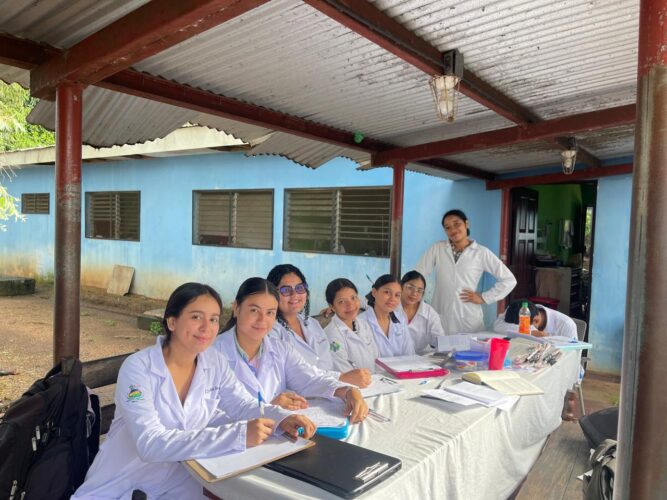
When we think about helping people in developing countries, it’s easy to picture boxes of medical supplies, textbooks, or donated equipment. These things certainly help. But years of research—and the lived experience of Adelante Mujer students—show that giving cash directly to women studying medical students can be the most effective, dignified, and transformative way to help.
⸻
What the Research Shows
Reducing poverty and food insecurity.
Across 56 different programs in low- and middle-income countries, a review of 165 studies found that cash transfers consistently reduce poverty and hunger. Families use this support to buy food, pay tuition, or cover transportation (GiveDirectly, n.d.-a). For our students, stipends often mean the difference between staying in school or dropping out to support their families.
Improving health and education.
Cash transfers have measurable effects on health outcomes. In some studies, unconditional transfers reduced illness by nearly 27% (Unconditional cash transfer, 2025). In Rwanda, a randomized trial showed that larger cash grants improved diets and even led to modest child growth gains, sometimes outperforming targeted nutrition programs (McIntosh & Zeitlin, 2020). Similarly, the World Bank reports that conditional cash transfers directly increase school attendance and completion across dozens of countries (Fiszbein & Schady, 2009). For Adelante Mujer, this translates into women completing their medical programs and bringing healthcare back to their communities.
Boosting wellbeing and dignity.
Beyond material outcomes, cash helps with mental health and dignity. A meta-analysis of 37 studies covering more than 112,000 people showed clear improvements in well-being (McGuire et al., 2020). For our students, knowing they have reliable support reduces stress and allows them to focus on studies, rather than worrying about choosing between tuition, food, or caring for their families.
Efficient and cost-effective.
Cash is often faster and cheaper than in-kind aid. Delivering textbooks or supplies internationally involves shipping and storage costs. By sending cash stipends directly, Adelante Mujer eliminates those overhead costs and gets resources into students’ hands exactly when and how they need them (Aid effectiveness, 2025).
Strengthening communities.
Finally, stipends ripple outward. When our students spend their stipends locally—on food, transport, or study materials—they support small businesses and their local economies (GiveDirectly, n.d.-b). And when they graduate, they give back as nurses, providing care that touches entire communities.
⸻
Tackling Common Concerns
Some people wonder if cash will be misused. But research consistently shows that recipients do not waste money on things like alcohol. Instead, they invest in education, food, health, and small businesses (GiveDirectly, n.d.-a). In fact, Adelante Mujer has clear safeguards: students must maintain an 80% GPA, submit grades every semester, and show proof of continued enrollment. This accountability ensures that every dollar goes where it matters most.
⸻
Why Cash Stipends Create the Deepest Change
- Dignity: Women choose what they need most—whether tuition, transportation, or food.
- Flexibility: One student may require uniforms, while another may need assistance with housing. Cash covers both.
- Scalability: Stipends can grow with need—expanding to more students as donor support increases.
- Ripple effects: A stipend helps one woman become a nurse, and her career supports entire families and communities.
⸻
In-kind gifts like supplies and textbooks will always have value, but evidence overwhelmingly shows that cash is the most meaningful help we can give. For Adelante Mujer students, stipends don’t just cover expenses—they keep dreams alive, reduce stress, and help women graduate as doctors and nurses who transform healthcare in Nicaragua and Guatemala.
When you give to Adelante Mujer, you are not just funding school—you are giving women the trust, opportunity, and dignity they need to build healthier futures for their communities.
Let’s change the world, one future doctor at a time.
Adelante, mujer. Forward, woman.

P.S. Don’t forget…..your donation will be DOUBLED between now and the end of the year, thanks to our generous Rita Thomas and her $50,000 matching challenge! Give today and make your gift count!
References
Aid effectiveness. (2025, January 15). Wikipedia. Retrieved September 11, 2025, from https://en.wikipedia.org/wiki/Aid_effectiveness
Fiszbein, A., & Schady, N. (2009). Conditional cash transfers: Reducing present and future poverty. World Bank. https://thedocs.worldbank.org/en/doc/111531529868058319-0160022017/original/Day39am10749.pdf
GiveDirectly. (n.d.-a). Research on cash transfers: What does the evidence say? Retrieved September 11, 2025, from https://www.givedirectly.org/research-on-cash-transfers
GiveDirectly. (n.d.-b). How cash transfers work. Retrieved September 11, 2025, from https://www.givedirectly.org
McGuire, J., Kaiser, C., & Bach-Mortensen, A. (2020). The impact of cash transfers on subjective wellbeing and mental health: A systematic review and meta-analysis. Happier Lives Institute. https://www.happierlivesinstitute.org/report/cash-transfers-systematic-review-and-meta-analysis
McIntosh, C., & Zeitlin, A. (2020). Cash versus food: Evidence from a randomized controlled trial in Rwanda. arXiv Preprint. https://arxiv.org/abs/2106.00213
Unconditional cash transfer. (2025, January 12). Wikipedia. Retrieved September 11, 2025, from https://en.wikipedia.org/wiki/Unconditional_cash_transfer
